
Community Care Network for Mental Health
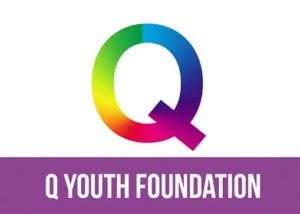
by Ana Y. Bernal, LGBTQIA2-S UsCC Member and Executive Director of Q Youth Foundation
A valuable intersection is missing as Mental Health Awareness Month and Pride Month ended and for some LGBTQIA2-S individuals, it is an in-between time where one fight ends, and another fight continues. But both struggles are never mutually exclusive of one another.
Since 2016, Q Youth Foundation has worked with Los Angeles LGBTQIA2-S community members by offering workshops to learn how to write their own stories as plays. The workshops have produced over 50 plays featuring fictional stories to autobiographical memoirs. In our workshops, we have tackled many conversations about form and process in writing – but a recurring theme within the stories is trauma and stigma that have shaped characters and plays. As a result, our workshops subconsciously began to form a network of community care. The writing group realized that there is a prevalence of trauma in our stories, recognizing how trauma affects us as individuals, and responded by addressing trauma in the creative practice of playwriting. We are creatives and not mental health professionals. However, through further research and development, we learned that we have engaged our community in a framework of Trauma-Informed Care.
I do consider us cultural and community organizers with the expertise of leading workshops and producing performances for audiences in Los Angeles. With Mental Health Awareness and Pride Month behind us, we continue to work with our community members in building brave spaces. Currently, we have produced accessible radio theater plays streaming on Spotify and YouTube platforms. To learn more about our current and ongoing projects, visit http://www.qyouthfoundation.org/.
Parasite
by Mishna Hernandez, Youth Community Member
Hands shaking, thoughts racing, stomach dropping.
Fork to plate, fork to mouth, over and over
Fullness getting closer and closer.
“You’re ruining it”, the Voice said
Cold, desperate, cruel.
It had me convinced
that hunger would bring my end
and I would not be missed.
Humanity.
Such a foreign idea.
Growing up with no tranquility.
Silence and forgetting, the panacea
for difficult feelings and pain.
Perfection, care-taking, self-sacrifice,
values from that Voice in my head,
soft and caring but really just death in disguise,
comfortable roles that with help I can break.
Values of my healthy self:
fairness, compassion, peace, and advocacy
Everyone is deserving
except me, for my inadequacy.
Everyone is free to make mistakes
except me, who must exist beyond humanity
Everyone is free to take up space
except me, so I make myself small.
Everyone can be human,
feel emotions,
fall down,
and have needs.
Except for me
I didn’t need that
as long as I did what the Voice in my head ordered me to do.
Waking up from the gaslighting
is so much easier said than done.
That Voice kept me safe and smiling
and kept me from feeling overrun.
It hurt me, yelled at me, made me feel like nothing.
Yet in tough moments, it always held my hand
“Nothing can hurt
if you disconnect your mind and body”.
Turned into an introvert.
Survived on only coffee.
That day
in which I felt my smallest
I found a bit of strength.
This Voice,
this friend
had never given me a choice
and had come to depend
on its control over my mind.
I had to fight,
but not alone.
I had to fight,
but not alone.
I looked for a light
and now I’m deep in a battle zone.
That Voice, like a parasite,
finds a brand new lie.
The enemy was food,
and now it is life.
Nothing will satisfy its appetite
until I say goodbye
before my time.
Except now, I can not let it win
It might succeed in a battle
but I know where I’ve been
and I’m no longer fragile.
Everyone can be human,
feel emotions,
fall down,
and have needs.
Except for me.
I didn’t need that.
At least, that’s the way it used to be.
At the start of every day
I have a choice to make:
dive into the unknown and live in the gray
or choose the Voice for comfort’s sake.
I know where the latter choice leads
so maybe this time I can expel the Voice from my head
and give myself a chance instead
Breaking the Vicious Cycle of Traumas
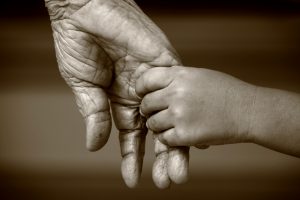
by Sam Keo, Psy.D., LACDMH Retiree
“I am so thankful for your workshop this morning. My son would have still been alive if I had met you last year,” was what a woman spoke to me as I left the podium. She told me that her son died by suicide recently. She saw all the warning signs she learned in the workshop, but she did not understand how the Holocaust, that happened decades ago—before she was even born—emotionally affected her son. Her grandfather, who was a Holocaust survivor, passed down his traumas to her parents, her parents passed those on to her, and she passed them on to her children. These latter three generations have never been lived or experienced the Holocaust, but yet, they are affected by these vicarious traumas.
In more than three decades as a clinician, I’ve seen the patterns of these cycles of traumas in the Cambodian population. Experts call these traumas, “Intergenerational Transmission of Traumas (ITT)”. As one of the Cambodia’s genocide survivors, I was fascinated by the development of the ITT and was curious of how I could help break these vicious cycles. I applied different therapeutic techniques to treat them and I found that the most effective treatment was attachment theory by Bowlby and Ainsworth. This technique plays a crucial role in the child’s psychological development and personality later on. It is essential to educate the client about parent-child relationships and how secure attachment can develop positive emotional health for the child.
I used my lunch break to hear her story, empathize with her, and offered my condolences. In my retirement note, I have expressed many thanks to my colleagues who have shaped my career and become who I am today. But as I am writing this article, I have realized that the biggest contribution to my career was my thousands of clients/patients. I want to thank them for trusting me and for allowing me to get to know them personally. I wish them the best.
Our Pain

by Anshu Agarwal, Psy.D., Clinical Psychologist
It has been two long months that I have been hearing about the devastation of the COVID-19 variant spreading through India. I have watched on the Indian News entire families get destroyed. In the United States people are talking about reopening, but India is closing down again. The pain has been growing in me, and it came to a head when my cousin was infected and died.
I remember in early April 2021, my cousin contracted COVID-19, but I did not think much of it. He was 33 years old and all I could think, was, he is young, he is healthy, he is going to make it. He was rushed to the hospital after a few days, and even then I did not think anything different, he is young, he is healthy, he is going to make it. He survived Covid-19, but due to his complications he developed viral Pneumonia, but still I was positive, he is young, he is healthy, he is going to make it. He then ended up on the ventilator, but still I thought, he is young, he is healthy, and he is going to make it. Only the day he died did I get the news that he was not oxygenating his blood, and the doctors did not think he would make it through the night? I was in shock, and all the hope I had used to dam my grief, had burst, and I could not stop myself from crying. He was young, he was healthy, he was supposed to make it, but he died.
I am writing this article one week after his death, and for most of the week I am just trying to make sense of why he died. I keep thinking about what I could have done to make a difference. My family just sits and blames themselves, and I am doing the same. I felt that COVID-19 has brought a lot of pain to others, but the loss of my cousin weighs very heavy in my heart. I imagine that everyone else that has lost someone might be feeling the same. Logically, I can say that things will get better, but for some reason I do not want to feel better, not right now. I want to sit in my pain, my loss, the same loss we are all facing. I feel that this is something that connects me to others, and our pain is one in the same, and I think it is more important we allow ourselves to be here together in our pain, then try to pretend we are okay. When it is time to feel better, I will, but this loss will take time, and we should all give ourselves permission to feel sad. I just hope people are able to recognize that this is not just my pain or their pain, it is our pain.
Writing Passage
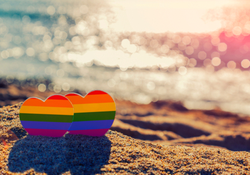
by José Paul Molina, Youth Community Member
Back in August, I was listening to a Haux song, “Salt,” and I misheard the lyric: “you can’t be lost if you can’t be found,” to “you can’t be loved if you can’t be found.” And suddenly, I was mind-blasted about this utter truth. I started thinking and meandering about the love I have received in relation to the things I wanted to be found and discerned about me and concluded that the condition of being “found” requires volition and honesty.
As a member of the LGBTQ+ community, I always tried to hide things that I love in fear of what the heteronormative society might do in response. And by doing so, I unconsciously hid my being from myself and others. At a young age, I did not get to freely explore the space my identity enthused for as much as I should have. Now, when people do find me, I’m not exactly myself. When we meet and depart, I’m elsewhere. Hidden deeper inside. And alas, they never truly “find” me because I never gave them the chance to.
You are what you love, but when you soon forget the loved things you hide, you find yourself trying to remember those very things that impassioned you since you were little.
Moment by moment, I’m finding and patching myself again from the strictures of society. I hope you let more people find you. But if you want to be found, be found as your true self. Otherwise, you will never be truly known. Make yourself present at your family table, take a friend’s invitation to dine out, or attend an organizational event. Amidst the awkwardness and anxiety, make a presence. You deserve to be found− and experienced− and found once again by the same people, and by new. By letting yourself be found, you find others who share common passions.
My voice, these words, and this message have not only found you. They have also embraced you without rejection. Now, find yours to give and be embraced by others.
Inner Thoughts
by Wendy Cabil, B.A., Client Stakeholder
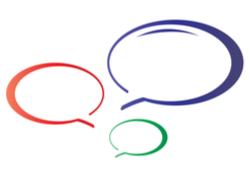
Once upon a time, three forces were engaged in a discussion. Here’s a snapshot of a special moment involving Hope, Wellness, and Recovery. Hope explained the importance of its role in the universe. Hope said, “without me, there is no need for the both of you to exist,” speaking to Wellness and Recovery.
“How so?” The two inquired. “Without us (Wellness and Recovery), you Hope would have nothing to strive for and demonstrate your ability. We represent action-oriented results to a productive life.” “Perhaps, you two do make a difference at some point”, stated Hope. “Of course, we do!” They both shouted. “As a matter of fact,” Wellness added, “I am progressive and on-going.” Recovery interrupted with “Amen!”
Then Recovery continued with “But I represent the process.” “Without me, how do you measure your progress, Wellness? And how do you gauge your condition Hope? I offer the context in which Hope inspires Wellness while keeping you two on the same page and connected. I also allow time the freedom to interact in the process so that we are united as one in a symphony.”
“Enough of this debate,” said Recovery. “Instead, let us focus our energies positively rather than challenge the importance of each other’s contribution. We need to spread the message to the world that Hope, Wellness and Recovery are essential keys to mankind living a fulfilled life no matter what stage of life he or she is experiencing.” “Also noteworthy,” added Hope, “is that we are freely given.”
Life’s Lessons
by Helen Salcido, Community Member
My name is Helen. I am an 80-year-old retired librarian. I am also a mother of three beautiful daughters and four amazing grandchildren. I grew up in a rural area in San Bernardino with every possible type of fruit trees that you can imagine.
This Pandemic has been very difficult. I miss getting together with my friends. Being retired, I was used to having a fully-booked calendar with many appointments for lunches with friends and birthday celebration dinners. Some call it being a “social butterfly,” but to me it’s all about loving and sharing with the people who are dear to me. As Barbra Streisand’s song says: “People who need people are the luckiest people in the world.” Until this pandemic gets under control, there are many things that we can do to take care of ourselves. Here are my top choices:

• Go walking with one of my neighbors (I walk with a cane, but little by little I have built up my endurance to walk up to three miles daily)
• Sit in the sun to relax and contemplate the beauty around me
• Keep up with old friends by chatting on the phone, including my cousins color in my inspirational coloring book with my crayons
• Read novels
• I give thanks to God that I woke up today, I’m healthy, I’m alive and I’m so blessed
• Spend time with my dog
Out of all these, the most important thing is love. Do not deprive yourself of it at any cost, like insecurities and your own fabricated excuses. If you love someone, show it. Do not keep it to yourself. You never know how long you or that person will be around. Do not risk living with such a regret. Embrace life and embrace love.
The Abundance of Simplicity
by Jorge Partida, Psy.D., Chief of Psychology
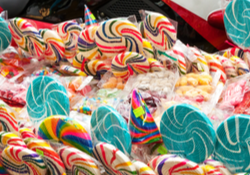 My fondest memories of my childhood in Mexico are infused with the abundance of simplicity. As an example, the celebration of Christmas Eve at home would include an endless dinner with the adults gathered laughing, dancing and singing all night. I would stay up as late as my small body could hold, enjoying vicariously the laughter and dancing of the adults. Eventually, sleep would win over and I would fall asleep across two chairs put together to form a makeshift bed. I would incorporate the sound of music and stomping of feet as my parents and uncles danced to sones, cumbias and mambo. My father would pick me up and carry me to my bed, reminding me to leave my shoes outside the door.
My fondest memories of my childhood in Mexico are infused with the abundance of simplicity. As an example, the celebration of Christmas Eve at home would include an endless dinner with the adults gathered laughing, dancing and singing all night. I would stay up as late as my small body could hold, enjoying vicariously the laughter and dancing of the adults. Eventually, sleep would win over and I would fall asleep across two chairs put together to form a makeshift bed. I would incorporate the sound of music and stomping of feet as my parents and uncles danced to sones, cumbias and mambo. My father would pick me up and carry me to my bed, reminding me to leave my shoes outside the door.
In the morning, I would awaken as early as I could and rush to receive the simple gift that filled my shoes to overflow with mandarin oranges, colaciones (hard pastel-colored candies with anise seed center) and mazapanes (peanut candy.) The gift was simple but so much appreciated and celebrated because the giver was said to be the baby Jesus himself. I would think of His little hand having touched the sweet delicacies and would enjoy every single bite with prolonged savoring so as to retain a connection to that miracle filling my shoes. We always knew that the big present would inevitably come later on the day of the three kings, January 6th. Every child would wake up on Three Kings Day to receive their wooden foot scooters, or bikes, dolls, toy cars and other shiny, trendy prizes. We would all enjoy playing and sharing the big presents from the Kings. For me and for most children I knew, the shoes filled with the simple presents from the baby himself meant so much more than the big, shiny gifts received by the Kings.
This simple memory remains at the core of my heart and soul. Through this cultural tradition, I have learned to value simplicity and appreciate the giver. The small and humble hand that gives with heart often is infused with more significance and meaning than the expensive and often disposable presents we tend to forget in days. May we always have the heart and soul to appreciate the abundance of kindness and simplicity.
Blog Search
About This Blog
The project has its roots in the Cultural Competency Committee’s “Share your Culture” initiative introduced by Co-Chairs, Mr. Sunnie Whipple and Ms. Bernice Mascher. This initiative engaged community members, consumers, family members, peers and staff alike in presenting on different aspects of their culture; thereby fostering cross-cultural learning, understanding, sensitivity, and appreciation.
The Cultural Traditions and Connections Blog came out of the need to connect with our committee members, inclusive of consumers, family members, peers, advocates, community members, colleagues and co-workers. It was fueled by the need to tell everyone that we care about what is happening within our families, our neighborhoods, our communities, our country, and our world.
We can all share and find nurturing connections by engaging in reading heartwarming articles and reflections that help us relax our tired minds, draw smiles across our faces, and comfort our spirits with a sense of collective caring found in the richness of who we are as human beings.
This blog’s content is managed by the members and staff of the Cultural Competency Committee.
